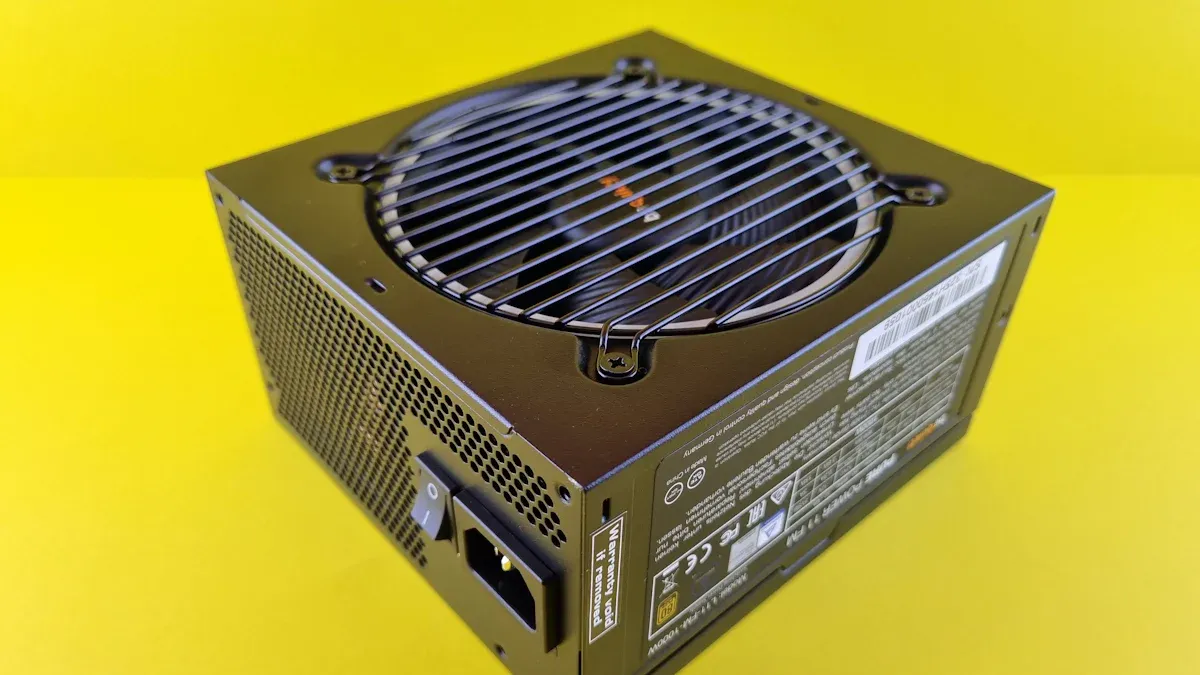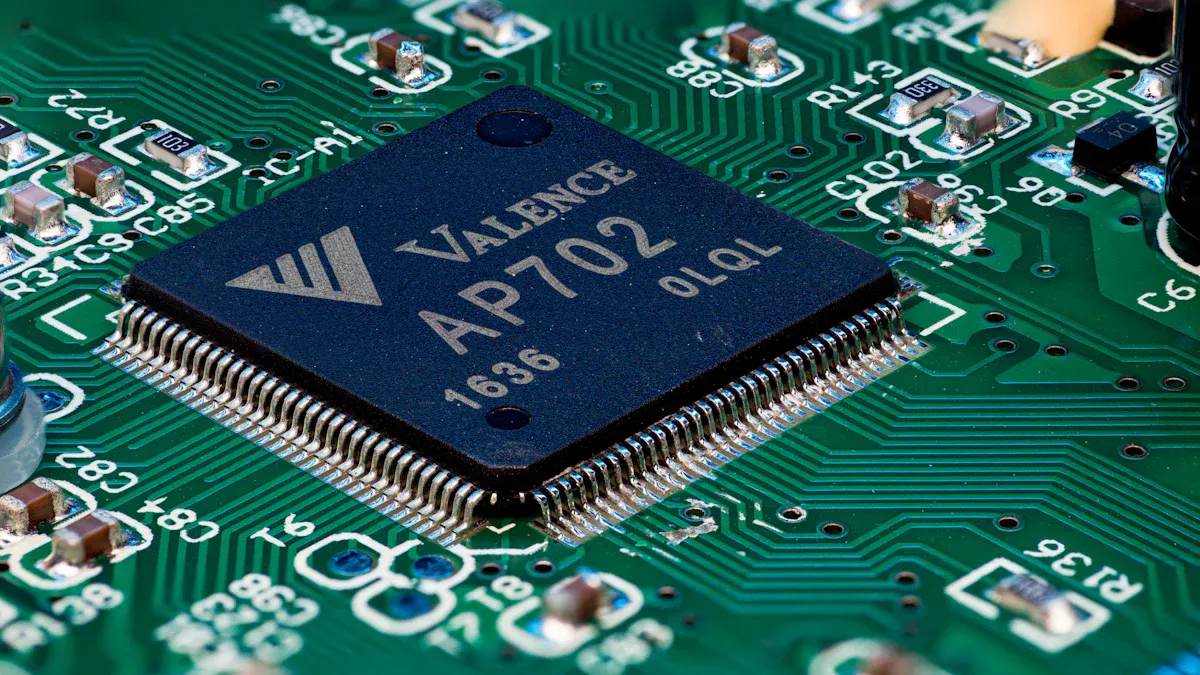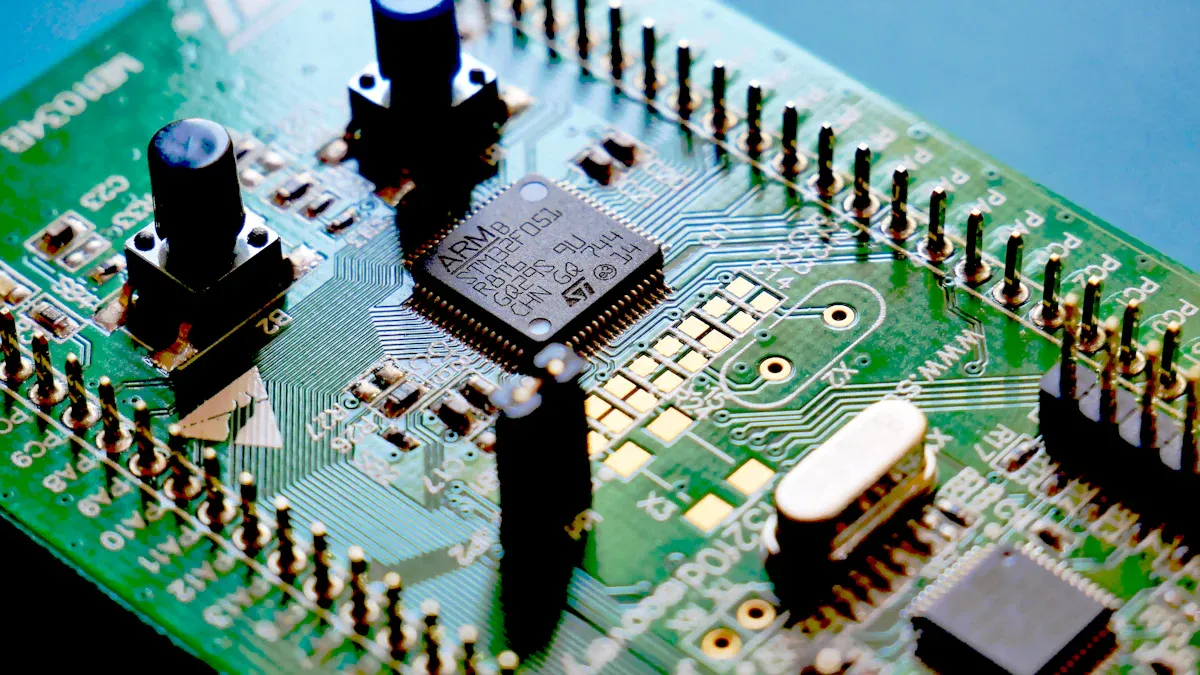AD9252BCPZ-50: Your Guide to Its Power

The AD9252BCPZ-50 is a specific variant of the AD9252 series. It functions as an octal, 14-bit, 50 MSPS analog-to-digital converter (ADC). This device converts analog signals into digital data. It achieves this with exceptional speed and precision. Engineers designed it for low cost, low power consumption, small size, and ease of use. These features make it ideal for demanding signal processing applications needing a small footprint. The AD9252 consumes 93.5 mW of power per channel when operating at 50 MSPS.
Key Takeaways
The AD9252BCPZ-50 is a special chip. It changes analog signals into digital data very fast and accurately.
This chip has eight channels. It can process many signals at the same time. It uses little power and is small.
It helps in many areas. These include medical imaging, communication devices, and industrial controls.
To use it well, you need to set up its power and clock carefully. This makes sure it works its best.
Key Features of the AD9252BCPZ-50

Octal-Channel Architecture
The AD9252BCPZ-50 features an octal-channel architecture. This means it has eight independent analog-to-digital converter channels. Each channel operates simultaneously. This design allows for the processing of multiple signals at once. It is highly efficient for systems requiring many input channels.
High Resolution and Speed
This ADC offers 14-bit resolution. This high resolution captures fine details in analog signals. It provides precise digital representations. The device also boasts a 50 MSPS (Mega Samples Per Second) sampling rate per channel. This speed ensures accurate conversion of fast-changing signals. The combination of high resolution and speed makes it suitable for demanding applications.
Low Power and Small Footprint
The AD9252BCPZ-50 is designed for low power consumption. It uses only 93.5 mW per channel at 50 MSPS. This low power usage reduces heat generation. It also extends battery life in portable devices. The device comes in a small package. This small footprint saves valuable board space. It is ideal for compact system designs.
Dynamic Performance
The AD9252BCPZ-50 delivers outstanding dynamic performance. It achieves high Signal-to-Noise Ratio (SNR). It also has excellent Spurious-Free Dynamic Range (SFDR). These metrics indicate the purity and accuracy of the converted signal. The Effective Number of Bits (ENOB) is also high. This ensures the digital output closely matches the original analog input. High dynamic performance is critical for signal integrity.
Flexible Interfaces
The AD9252BCPZ-50 offers flexible digital interface options. It uses Serial LVDS (Low-Voltage Differential Signaling). This interface provides high-speed data transfer. It also minimizes electromagnetic interference. The Serial LVDS interface simplifies connectivity with digital processors. This flexibility allows for easy integration into various system architectures.
Applications of the AD9252BCPZ-50
This section explores the diverse real-world applications where the AD9252BCPZ-50's capabilities are most beneficial. Its unique features make it a powerful component in many advanced systems.
Medical Imaging Systems
Medical imaging systems rely on precise signal conversion. The AD9252BCPZ-50 excels in these demanding environments. Its octal-channel architecture allows simultaneous processing of signals from multiple transducers. This capability is crucial for ultrasound machines. High resolution captures fine details in patient data. This leads to clearer images for diagnosis. Low power consumption also benefits portable medical devices. It extends battery life and reduces heat.
Communications Equipment
Modern communication systems demand fast and accurate data capture. The AD9252BCPZ-50 provides high-fidelity signal conversion for these applications. Its high speed and dynamic performance enable wide bandwidth processing. This supports multi-channel reception and transmission. Engineers use it in software-defined radios (SDRs). It also finds use in cellular base stations and satellite communication systems. The flexible interfaces simplify integration into complex digital signal processing chains.
Test and Measurement
Test and measurement equipment requires extreme accuracy. The AD9252BCPZ-50 offers the precision needed for these tools. Its 14-bit resolution and high sampling rate ensure accurate measurement of complex signals. It performs precise data acquisition across multiple channels. This makes it ideal for advanced oscilloscopes and spectrum analyzers. It also suits general-purpose data acquisition systems. The outstanding dynamic performance guarantees signal integrity during analysis.
Industrial Control
Industrial control systems often operate in harsh environments. They require reliable and efficient components. The AD9252BCPZ-50's low power consumption and small footprint are significant advantages here. It allows for compact system designs. It also reduces energy costs in large-scale operations. The octal channels enable monitoring of multiple sensors simultaneously. This improves efficiency in process control, factory automation, and robotics.
Radar and Sonar Systems
Radar and sonar systems detect objects and measure distances. They need high-speed, multi-channel data acquisition. The AD9252BCPZ-50 provides these capabilities. Its octal channels process signals from multiple array elements at once. This enables high-resolution target detection. It also supports precise ranging. The high sampling rate and dynamic performance are critical for accurate signal processing in phased array radar and underwater sonar applications.
Integrating the AD9252BCPZ-50

Designers often incorporate the AD9252BCPZ-50 into their projects. This section offers practical advice for successful integration. Proper design practices ensure optimal performance from this powerful ADC.
Design Considerations
Successful integration of the AD9252BCPZ-50 requires careful attention to several key areas. First, power supply decoupling is crucial. Designers must place bypass capacitors close to the ADC's power pins. This minimizes noise on the power lines. It ensures stable operation and maintains signal integrity. Second, clocking demands precision. A clean, low-jitter clock source is essential for high-performance data conversion. Poor clock quality can degrade the ADC's dynamic range. Designers should use dedicated clock buffers and proper trace routing to deliver a stable clock signal. Third, input impedance matching is vital for analog input signals. Matching the source impedance to the ADC's input impedance prevents reflections. It also maximizes power transfer. This practice ensures the ADC receives the cleanest possible analog signal.
Development Resources
Analog Devices provides several resources to assist with integration. The AD9252-50EBZ evaluation kit is a primary tool. This kit allows designers to test the AD9252BCPZ-50's performance. They can prototype designs and verify functionality. The evaluation board includes necessary support circuitry. It simplifies the initial setup process. Additionally, Analog Devices offers comprehensive documentation. This includes datasheets, application notes, and reference designs. These resources provide detailed technical specifications and implementation guidelines. They help designers overcome common challenges. They also accelerate the development cycle for new projects.
This powerful ADC stands as a versatile, high-performance, and cost-effective component. It delivers octal-channel precision, impressive speed, low power consumption, and a small footprint. These core advantages significantly improve system performance, enhance design flexibility, and reduce overall system cost.
We encourage designers to consider this ADC for their next high-performance analog-to-digital conversion projects. It holds the potential to unlock new possibilities across diverse fields.
Indeed, such advanced components drive technological innovation forward.
FAQ
What is the AD9252BCPZ-50?
The AD9252BCPZ-50 is an advanced analog-to-digital converter (ADC). It changes analog signals into digital data. This device has eight channels. It offers 14-bit resolution and samples at 50 MSPS. It is known for its speed and precision.
What does "octal-channel" mean for this ADC?
"Octal-channel" means the ADC has eight separate input channels. Each channel works independently. This allows the device to process eight different analog signals at the same time. This feature is very useful for systems needing many inputs.
Why is low power consumption important for the AD9252BCPZ-50?
Low power consumption means the device uses less electricity. This reduces heat generation. It also helps extend battery life in portable devices. For large systems, it lowers overall energy costs. This makes the ADC efficient and practical.
What types of applications benefit most from this ADC?
Many advanced systems use this ADC. These include medical imaging, like ultrasound machines. Communications equipment, such as base stations, also uses it. Test and measurement tools, industrial controls, and radar systems benefit from its capabilities. 🚀
How does the AD9252BCPZ-50 ensure good signal quality?
The AD9252BCPZ-50 has excellent dynamic performance. This includes high Signal-to-Noise Ratio (SNR) and Spurious-Free Dynamic Range (SFDR). These features mean the digital output is very clean and accurate. It closely matches the original analog signal.
See Also
Unveiling the Essential Role of ON Semiconductor Power Management Solutions
MOSFET Fundamentals: A Comprehensive Guide for Electronics Enthusiasts
Understanding SON8 Power Management Chips: Functionality and Applications Explained
High Voltage Power Modules: Exploring Their Design and Diverse Applications
Finding Reliable ADI Authorized Distributors: Your 2025 Guide
